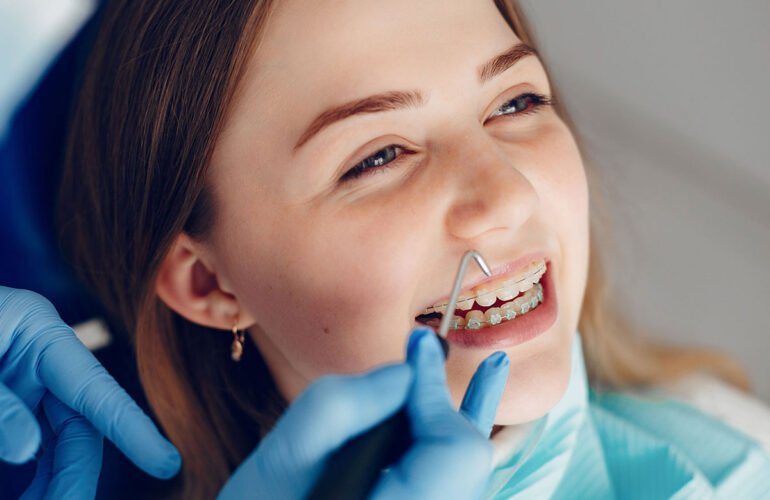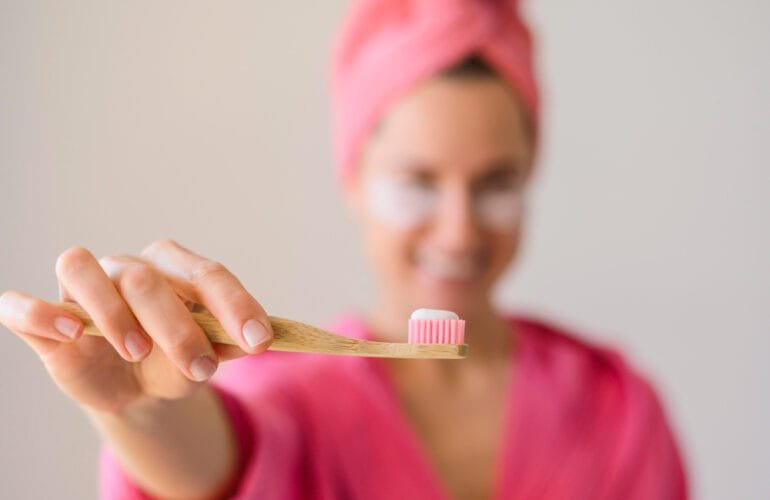Maintaining healthy teeth and gums goes far beyond brushing and flossing it begins with what you eat and drink every single day. For patients , understanding the link between diet, gum disease, enamel erosion, and tooth decay is one of the most powerful steps towards a brighter, stronger smile.
A tooth-friendly diet can not only prevent cavities but also reduce gum inflammation, support bone health, and protect enamel from acid erosion. In this article, we’ll explore exactly how your diet impacts your oral and tooth health and give you practical, evidence-based advice to keep your smile in top condition.
Sugar, Fermentable Carbohydrates & Tooth Decay
Sugar is the number one enemy of tooth health. When you consume foods or drinks high in free sugars like sweets, biscuits, fizzy drinks, or even dried fruit the bacteria in dental plaque feast on them. This process produces acid, which erodes enamel and leads to cavities.
The problem is not just the amount of sugar you eat but also how often you consume it. Snacking throughout the day on sugary foods exposes your teeth to repeated acid attacks, leaving little time for natural remineralisation.
Key facts:
- Fizzy drinks and fruit juices are particularly harmful, even when labelled “no added sugar,” due to their natural acidity.
- Hidden sugars are everywhere from breakfast cereals to sauces. Always check labels.
- Restrict sugary foods to mealtimes and rinse your mouth with water afterward.
Acids & Enamel Erosion
Unlike decay, which is caused by bacteria, dental erosion happens when acids directly dissolve enamel. Drinks such as citrus juices, sports drinks, vinegar-based foods, and wine are common culprits.
Enamel is the hardest tissue in the body, but once it’s gone, it doesn’t grow back. Instead, the body relies on saliva and fluoride to remineralise weakened enamel.
Tips for protection:
- Use a straw for acidic drinks to reduce contact with teeth.
- Wait at least 30 minutes before brushing after acidic meals to avoid brushing softened enamel away.
- Choose still water or milk instead of soft drinks to protect enamel.
Nutrient Deficiencies & Gum Health
Strong teeth and better tooth health need more than just good cleaning they need the right nutritional building blocks. Deficiencies in key vitamins and minerals can weaken gums and bone.
- Vitamin C: Deficiency can cause swollen, bleeding gums and slow healing. Fresh fruits and vegetables like oranges, peppers, and broccoli are excellent sources.
- Vitamin D: Without it, your body cannot absorb calcium effectively. Deficiency increases gum disease risk. Sunlight, oily fish, and fortified foods are key.
- Calcium & Phosphorus: These minerals form the foundation of strong enamel. Dairy, leafy greens, and almonds provide them in abundance.
By ensuring your diet contains these nutrients, you can strengthen your resistance against gum disease and maintain healthy supporting structures for your teeth.
Anti-Inflammatory Foods & Periodontal Disease
Gum disease (periodontitis) is a major cause of tooth loss in adults and is linked with systemic conditions like heart disease and diabetes. One of the strongest dietary links to gum disease is inflammation.
Processed foods, excessive red meat, refined carbs, and sugary drinks increase systemic inflammation. On the other hand, anti-inflammatory diets rich in antioxidants, omega-3 fatty acids, and polyphenols reduce gum inflammation.
What to eat more of:
- Oily fish like salmon or mackerel (rich in omega-3).
- Leafy greens, berries, and nuts (antioxidant-rich).
- Green tea (polyphenols that fight gum inflammation).

Saliva, Hydration & Oral Cleansing
Saliva is one of the most overlooked protectors of oral health. It:
- Neutralises harmful acids.
- Helps remineralise enamel.
- Washes away food particles.
A dry mouth (xerostomia) caused by dehydration, certain medications, or excessive alcohol/caffeine increases the risk of decay and gum disease.
Practical advice:
- Drink water throughout the day (tap water in many UK areas contains fluoride, which strengthens enamel).
- Chew sugar-free gum after meals to stimulate saliva.
- Avoid excessive alcohol and caffeine, which dry the mouth.
What a Gum-&-Tooth Friendly Diet Looks Like
A balanced, tooth-friendly diet for better tooth health should include:
- Dairy or plant-based alternatives: cheese, milk, yogurt (rich in calcium).
- Lean protein: chicken, fish, beans, lentils (for tissue repair).
- Fruits & vegetables: provide vitamins and stimulate chewing.
- Wholegrains: provide fibre and nutrients while reducing inflammation.
- Water: the ultimate sugar-free drink.
Foods to avoid or limit:
- Sticky sweets (cling to teeth).
- Sugary drinks (prolonged acid exposure).
- Energy and sports drinks (acidic + sugary).
Common Dietary Risks to Watch Out For
Patients often consume:
- Fizzy drinks: very common in teenagers, posing high cavity risk.
- Frequent snacks: crisps, biscuits, sweets between meals increase acid attacks.
- Dried fruit: healthy in moderation but sticky and high in sugar.
- Alcohol: beer, cider, and wine are acidic and dry the mouth.

How Diet & Oral Hygiene Work Together
Even the best diet won’t protect your teeth without proper hygiene. For best results:
- Brush twice daily with fluoride toothpaste.
- Floss or use interdental brushes daily.
- Limit sugar intake to mealtimes only.
- Visit your Local dentist regularly for check-ups and professional cleanings.
When diet and hygiene work hand in hand, your risk of tooth decay and gum disease drops dramatically.
Summary
A poor diet is one of the leading causes of gum disease, enamel erosion, and cavities. But the good news is that small, consistent changes in diet like reducing sugar, eating more fresh produce, and drinking more water can transform your oral health. Pair a balanced diet with daily oral care and regular dental visits, and you’ll set yourself up for a lifetime of healthy smiles.
Your diet plays a far greater role in gum and tooth health than most people realise. Every meal either strengthens or weakens your enamel, gums, and overall oral balance. By choosing nutrient-rich foods like leafy greens, dairy, and whole grains you help your mouth fight harmful bacteria, reduce inflammation, and support natural enamel repair. Even small changes, such as cutting down on sugary drinks and staying hydrated, can make a noticeable difference in your daily oral comfort and long-term tooth health.
Maintaining healthy teeth isn’t just about brushing and flossing; it’s also about what you feed your body. A balanced diet combined with consistent oral hygiene creates the foundation for lasting dental strength and a confident smile. If you’re ready to improve your gum and tooth health, start by making mindful choices at every meal your smile truly reflects what you eat.
Disclaimer: This article is for general informational purposes only and should not be relied upon as medical or dental advice. Always consult your dentist or healthcare professional for personalised guidance.
Frequently Asked Questions (FAQs)
Q1: How much sugar is too much for my teeth?
A: The less added sugar, the better. The World Health Organization (WHO) recommends limiting free sugars to less than 10% of total energy intake, ideally below 5%. Even small amounts of sugar, especially when consumed frequently, increase risk of decay. Changing sugary snacks to lower sugar options or restricting sweets to mealtimes helps reduce acid attacks.
Q2: Is fruit bad for my teeth because it contains sugar?
A: Whole fruit is generally much better than sugary snacks or fruit juices. Whole fruits come with fiber, water and chewing helps stimulate saliva, which neutralises acids. The sugars are slower to reach teeth. However, fruit juices and dried fruits are more concentrated and more likely to feed decay-causing bacteria consume these in moderation and with meals, or rinse with water after.
Q3: Will calcium supplements help if I don’t get enough from diet?
A: Supplements can help, especially in individuals with dietary restrictions (e.g. vegans, those with lactose intolerance) or where diet alone can’t meet needs. But it’s best to aim to get nutrients from whole foods, as they come as part of balanced package (vitamins, minerals, fibre). Before taking supplements, it’s wise to discuss with a dentist or GP, since over-supplementation (especially of fat-soluble vitamins) can have risks.
Q4: What about sugar-free gum or xylitol?
A: Chewing sugar-free gum (particularly with xylitol) after meals can be beneficial. It stimulates saliva flow, helps neutralise acids, and can lower plaque levels.
Q5: Can changing diet reverse gum disease?
A: Early stage gum disease (gingivitis) often can be reversed with good oral hygiene, professional cleaning, and dietary improvement (better nutrients, reducing sugar, improving immunity). More advanced disease (periodontitis) may require more intensive treatment (scaling, root planing, possibly surgery) alongside diet change. But diet still plays a supportive role.
Q6: Are special “teeth-strengthening” foods or diets (Mediterranean diet) actually helpful?
A: Yes. Studies show that a Mediterranean-style diet (rich in vegetables, nuts, healthy oils, fish) is associated with lower gum inflammation. Such diets tend to be anti-inflammatory, rich in antioxidants, appropriate calcium, vitamins and lower in processed sugar all beneficial for teeth and gums.
Q7: Can my diet really improve gum and tooth health?
A: Yes what you eat has a direct impact on gum and tooth health. Nutrient-rich foods like leafy greens, dairy, and fish support gum tissue repair, strengthen enamel, and help prevent decay. A balanced diet is one of the best long-term investments in overall tooth health.
Q8: Which drinks are best for maintaining healthy teeth and gums?
A: Water and milk are the most tooth-friendly drinks for promoting strong enamel and good tooth health. They help rinse away acids, keep you hydrated, and protect your gums. Try to limit fizzy or sugary drinks, as they can erode enamel and harm gum tissue over time.
Q9: How fast can diet changes improve tooth health?
A: You may notice fresher breath and reduced gum sensitivity within a few weeks of improving your diet. However, long-term benefits for tooth health like stronger enamel and healthier gums come with consistent habits, balanced nutrition, and good oral hygiene.
Looking after your smile : At Smilebay in Lymm Cheshire, we provide preventive advice, professional hygiene visits, and tailored treatments to keep your gums and teeth healthy. 👉 Book your appointment today.
References
- Moynihan, P., & Petersen, P. E. Diet, nutrition and the prevention of dental diseases. Public Health Nutrition. (WHO Collaborating Centres) Cambridge University Press & Assessment
- The American Dental Association. Nutrition and Oral Health. ADA
- Harvard T.H. Chan School of Public Health, Oral Health and Nutrition: What You Eat and Drink Affects Your Teeth. The Nutrition Source
- Influence of diet and nutrition on oral health – A review. adejournal.com
- Dietary interventions and nutritional impact on oral health and development. SpringerLink
- Scientific findings from a recent study (UK) showing Mediterranean-style diet reduces gum inflammation. EatingWell




